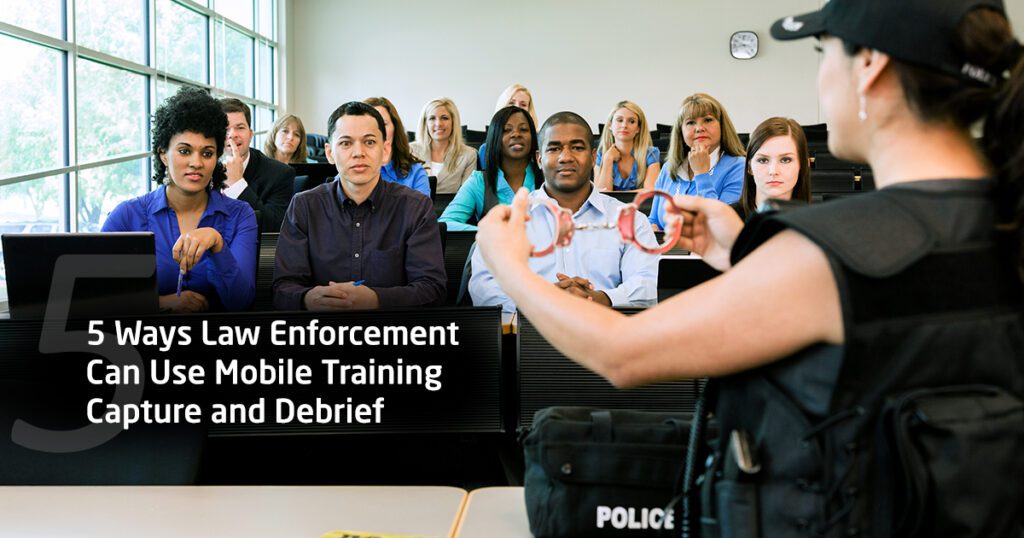Law enforcement officers are increasingly called to handle mental health and substance use crises, with such incidents making up at least 20% of police calls. This growing demand highlights the need for more effective training methods that go beyond traditional techniques.
Simulation training, enhanced by mobile training capture and debrief technology, offers a dynamic and innovative approach to preparing officers for these and other challenging situations. This technology can supplement traditional training methods, ensuring officers are better prepared for their roles.
Here, we’re exploring five potential applications for mobile simulation technology in law enforcement training, as well as the benefits of integration into your training curriculum.
1. Tactical Response Training
Tactical response scenarios are essential for preparing officers to handle high-risk situations like active shooter incidents or hostage rescues. Mobile training capture technology allows mock exercises to be recorded and reviewed in detail. This enables trainers to provide immediate feedback on tactics, communication, and decision-making. Likewise, officers can visually analyze their actions and learn from mistakes in a controlled environment, improving their readiness and confidence in dealing with real-life situations.
2. Traffic Stop Simulations
Traffic stops are routine yet potentially volatile encounters, making up about 40% of all civilian encounters. What’s more, a majority of officers believe these situations to be more dangerous than service calls.
Simulating traffic stops — enhanced by mobile capture technology — can help officers better prepare by affording them the opportunity to:
- Practice applying legal and policy-based procedures.
- Hone their observational and judgment skills.
- Practice for a variety of situations.
Reviewing footage of these simulations helps officers refine their approach, ensuring they follow proper protocols and maintain compliance with safety policies while also assisting instructors in identifying areas where additional practice is needed.
3. Crisis Negotiation Exercises
In life-or-death situations, there are no second chances. Negotiation skills are critical in resolving high-stakes situations involving hostages or individuals in crisis.
Mobile simulation technology enables instructors to record simulated crisis negotiation exercises, providing a means to review and analyze communication techniques and psychological negotiation approaches. In doing so, trainers and officers can pinpoint effective strategies and identify areas needing improvement, ensuring officers are well-prepared to de-escalate crises.
4. Use-of-Force Scenarios
The use of force is one of the most highly scrutinized aspects of law enforcement. So much so that many officers feel less motivated to work with the communities they serve, believing their jobs are more dangerous.
By simulating use-of-force scenarios recorded for later review, trainers can assess the appropriateness and effectiveness of the force used and work with officers-in-training to correct mistakes, ensuring compliance with departmental policies and legal standards. In doing so, use-of-force scenarios provide a basis for transparent evaluations and accountability, allowing police forces to identify and mitigate potentially deadly use-of-force violations.
5. Community Policing Initiatives
Building trust and fostering positive relationships in the community is essential for effective policing. Likewise, establishing a relationship with the community makes officers feel better about their jobs and more connected to those they serve. However, establishing relationships with communities that may not inherently trust officers is no easy feat.
Again, simulations can significantly enhance officer training in community engagement techniques. Rather than focusing solely on policies and procedures, these simulations allow future officers to refine their communication skills and emotional intelligence.
Recording community interaction exercises enables officers to receive constructive feedback on their communication and engagement strategies, promoting better community relations and trust.
Integration Benefits of Mobile Training Capture and Debriefs
Immediate and Actionable Feedback
One of the most significant benefits of mobile training capture technology is the ability to provide immediate feedback. Instructors can review footage with trainees right after a scenario, highlighting strengths and areas for improvement. This real-time feedback loop accelerates learning and skill acquisition, as officers can correct mistakes and reinforce positive behaviors on the spot.
Enhanced Training Efficiency
Traditional training methods often require significant resources and time. Mobile capture technology streamlines the training process by allowing multiple sessions to be recorded and reviewed simultaneously. This means that more officers can be trained in less time without compromising the quality of the training. Efficiency gains can also benefit departments by enabling them to focus on other critical areas of officer development.
Data-Driven Insights
The data collected through mobile training capture provides valuable insights into training effectiveness and officer performance. Departments can analyze trends, identify common areas of difficulty, and adjust training programs accordingly. This data-driven approach ensures that training remains relevant and effective, addressing the evolving needs of law enforcement.
Cost-Effectiveness
Investing in mobile training capture technology can result in long-term cost savings. By improving training efficiency and reducing the need for repeated sessions, departments can allocate resources more effectively. Moreover, identifying and addressing issues before they arise can prevent costly mistakes and liabilities.
Better Training Means Better Policing
Law enforcement is increasingly being asked to do more and more, often with reduced budgets and training. Mobile training capture and debrief technology has the potential to reverse these trends.
For agencies looking to advance their training initiatives, Education Management Solutions’ Training in Motion® can significantly enhance officers’ preparedness and effectiveness by:
- Providing real-time feedback
- Enhancing training efficiency
- Offering data-driven insights
- Reducing training costs
Contact EMS today for more on how implementing this technology can take your training programs to the next level and, ultimately, lead to better policing.

